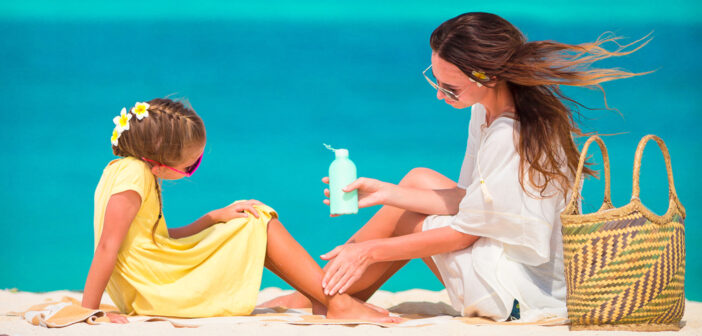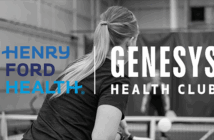By Peggy Agar, Hurley Marketing/Social Media Specialist
Summer is here! And that means most of us will be heading out to enjoy the weather at the pool or the lake. It also means a lot of people will be miserable with sunburn. The sun’s UV rays are the strongest between 10am to 4pm, so take extra precautions during those hours or avoid the sun, if possible.
Hurley Children’s Hospital Pediatrician, Gwendolyn Reyes, MD says babies six months and younger generally shouldn’t use sunscreen if direct sunlight exposure can be avoided. If that’s not possible, apply a small amount of sunscreen to exposed areas like the face. A swim shirt can add UV protection, but make sure exposed skin is still protected.
“Creams and lotions make it easier to cover all of the sun-exposed areas. remember to pay extra attention to the face, nose and ears.”
Dr. Gwendolyn Reyes
For everyone else, more studies are needed to prove if 50+ SPF products provide more protection. You should pick a broad-spectrum, water-resistant formula with a minimum SPF15 or 30, because this will protect against both UVB and UVA rays. Dr. Reyes says, “It is recommended to use mineral or physical sunscreens like zinc oxide or titanium oxide because they are not absorbed into the skin like chemical sunscreens and tend to be less irritating.” Some sunscreen formulas contain a chemical called oxybenzone. “It is best to avoid this chemical, because it can impact your child’s hormone system in the body,” Dr. Reyes adds.
Sunscreen sprays are convenient, but Dr. Reyes suggests using a lotion or cream formula instead as it is hard to apply an adequate amount of the product with a spray. “Creams and lotions make it easier to cover all of the sun-exposed areas,” she says. “And remember to pay extra attention to the face, nose and ears.”
It is recommended that sunscreen be applied 15-30 minutes before going out in the sun. Reapply every two hours and after swimming, sweating or drying off with a towel. UVA rays reflect off the water (making them stronger), so it’s important to reapply sunscreen often.
If your child gets a sunburn, make sure he or she stays hydrated, drinking plenty of water. Kids should consume water or a sports drink every 20 minutes while outside anyway, to prevent heat-related illness. Cool water on the body can lower the skin’s surface temperature and provide some relief for the pain of sunburn. Children’s Tylenol® or Motrin® can also be given to children six months or older. If your child has a severe burn with blistering, you should contact your pediatrician.
To make an appointment with a pediatrician at Hurley Children’s Clinic, call 810.262.9773 or visit hurleymc.com. Have a safe summer!





